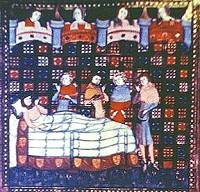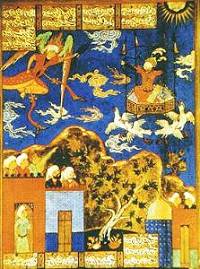Home
Alexander the Great died in Babylon in the summer of 323 BC. In his brief reign he not only conquered the greatest part of the then known world, but brought vast changes to the regions of the empire that he built.

His life and deeds, as well as his death and burial, became a legend for future generations, far beyond the lands he had conquered. He was remembered in legend1 from Iceland to China and is still invoked as their ancestor or patron by tribesmen in Afghanistan.
In fact, until the Renaissance, it is the legend of Alexander that prevailed, as reliable historical sources were practically unknown.
The legend differed greatly from one region to another and was adapted and merged with pre-existing local traditions.
 The legend of Alexander started spreading right after Alexander's death and overshadowed his real life. Alexander became a mythical figure, a theme for folk-songs, epics and anecdotes. Even his name was modified or distorted.
The legend of Alexander started spreading right after Alexander's death and overshadowed his real life. Alexander became a mythical figure, a theme for folk-songs, epics and anecdotes. Even his name was modified or distorted.
Alexander's personality was adapted according to the use each nation or tribe made of the conqueror's fame. He became a local hero. Even the Persians, whose empire Alexander had conquered, made of him a Persian hero, son of Darius.
It seems that the legend of Alexander had its roots in Egypt, was written in Greek and was falsely attributed to Callisthenes. Thus it remained known as the Pseudo-Callisthenes2.
It was translated and rendered in many versions and in many languages spreading all over the Eastern and Western world.
The legend had little in common with the true story of Alexander: The Byzantines made of Alexander a Saint while the Mohammedans include his deeds in the Koran, to mention only two extremes.
There are adaptations of Alexander's Romance in prose and verses, in the Greek language, Latin, Syriac, Armenian, Persian, Arab, Hebrew, Coptic, Ethiopian, Spanish and numerous other languages and dialects. In French, the Romance is known as "la légende" or "la Romance d'Alexandre" and Alexander is one of the gallant knights of Charlemagne, in English it is "the Romance of Alexander", in German "Alexandersage".
The Byzantines transmitted the legend to the Slavs and we have Alexander's Romance in the folklore of the Serbs, Croats, Czechs, Poles etc.
This paper, however, is limited to the history and myth connected with the "last dwelling" of Alexander: his mausoleum, whose splendour and display of wealth were the admiration of historians and travellers for centuries, and still excite the popular imagination.
Photos: Two tapestries. Alexander the Great on his death bed (top); the Persians made a hero of Alexandria the Great (bottom).
1. For the Romance of Alexander see: A. Adel, Le Roman d'Alexandre. Legendaire Medieval, Bruxelles (1955). J.A. Boyle, "The Alexander Romance in Central Asia". Zentralasiatische Studien 9 (1965): 265 and "The Alexander Romance in the East and West", B.J.R.L. 60 (1977): 13 F.W. Cleaves, "An early Mongolian Version of the Alexander Romance", Harv. J. Asiatic Stud. 22 (1922). R. Dankoff, "The Alexander Romance in the Diwan Lughat-Turk", Humaniora Islamica 1 (1973): 233. T. Fahd, La version arabe du Roamn d'Alexandre, Graeco-Arabica, vol. IV (1991), P.M. Fraser, Ptolemaic Alexandria, vol. 1 (1972), 676. I. Friedlaender, Die Chadhirlegende und der Alexanderroman (1913). E. Garcia Gomez, Un Texto Arabe Occidental di la legenda di Alejandro (1929). D. Holton, The Tale of Alexander, the Medieval Greek rhymed version (1974). J. Horowitz, Koranische Untersuchungen (1926), 111-113. J.J. Kazis, Book of the Gests of Alexander of Macedon (1962). M.S. La Du, ed., The Medieval French Roman d'Alexandre, vols. 1-6 (1937-1955). R. Macuch, "Pseudo-Callisthenes Orientalis and the problem of Du l-qarnian", Graeco-Arabica, vol. IV (1991). M. Marin, Legends on Alexander the Great in Moslem Spain, Graeco-Arabica, vol. IV (1991), M.M. Mazzaoui, "Alexander the Great and the Arab Historians", Graeco-Arabica, vol. IV (1991). F. Pfister, Der Alexanderroman, mit vervandten Texten (1978). D.J.A. Ross, Alexander Historiatus (1963). L. Ruggini, "Il Mitto di Alessandro dall'eta Antonina al Medioevo", Athenaeum 43 (1965) : 3. G.V. Smithers, ed., King Alisaunder, vols. 1-2 (1952, 1957). A.M. Wolohojian, The Romance of Alexander, trans. from Armenian (1969).
2. R. Macuch, Pseudo-Callisthenes, op. cit.